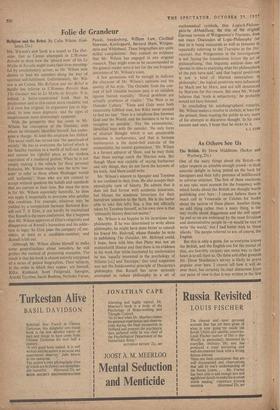Folic de Grandeur
Religion and the Rebel. By Colin Wilson, (Gol- lancz, 2 Is.) MR. WILSON'S new book is a sequel to The Out- sider. Just as Camus attempted in L'Hontine Revolle to show how the 'absurd men' of his Le Mythe de SiSyphe might make their lives meaning.; ful by revolutionary action, so Mr. Wilson now desires to lead his outsiders along the way of spiritual self-fulfilment. Unfortunately, Mr. Wil- son is no Canius. His Religion and the Rebel is hardly less inferior to L'Hoinnie Revolt(' than The Outsider was to Le Mythe de Sisyphe. It is, indeed, a better-constructed book than its .predecessor and to this extent more readable; but it is even less original, its arguments just as slip- shod, its tone more dogmatic, and the signs of megalomania more distressingly apparent.
With the prosperity that has come to Mr. Wilson, his conception of the Outsider, with whom he obviously identifies himself, has under- gone a change. At least the emphasis has shifted. The social misfit has turned into 'the spearhead of society.' He has to overcome the hatred which is his 'healthy reaction to a world of half-sick men' and assume his rightful place as the modern equivalent of a medkeval prelate. When he is not simply making it the vehicle for these personal fantasies, Mr. Wilson mainly uses the term 'out- sider' to refer to those whom Heidegger would call 'authentic': those who are not content to accept without question the beliefs and standards that are current in their time. But since the term is for Mr. Wilson supremely honorific, he does not apply it impartially to everyone who satisfies this condition. For example, whatever may be yielded by a comparison between Bertrand Rus- sell and T. S. Eliot, it can hardly be maintained that Russell is the more conformist. But it happens that Mr. Wilson approves of Eliot's religiosity and disapproves of Russell's humanism and his addic- tion to logic. So Eliot joins the.company of out- siders, at least as a candidate-member; and Russell is left out.
Although Mr. Wilson allows himself to make some generalisations about outsiders, he still prefers the method of presenting examples. The result is that his book is almost entirely composed of a series of potted biographies. Their subjects, in the order in which they appear, are himself, Rilke, Rimbaud, Scott Fitzgerald, Spengler, Arnold Toynbee, Jacob Boehme, Nicholas Ferrar, Pascal, Swedenborg, William Law, Cardinal Newman, Kierkegaard, Bernard Shaw, Wittgen- stein and Whitehead. These biographies are quite skilful compilations: they contain no evidence that Mr. Wilson has engaged in any original research. They might even so be recommended to the general reader were it not for the too frequent intrusions of Mr. Wilson's voice.
A few quotations will be enough to indicate the character of Mr. Wilson's opinions and the quality of his style. 'The Outsider finds the con- cept of hell valuable because pain is an antidote against human stupidity.' Moral problems are actually problems of vitality.' The West is an Outsider Culture.' Yeats and Gide were both reasonably fulfilled men, but Rilke never seemed to find his feet.' Man is a telephone line between God and the World, and his business is to be as receptive as possible.' For the existentialist,' identified here with the outsider, 'the only form of abstract thought which is not unutterable nonsense is mathematics; and that is because mathematics is the dumb-bell exercise of the existentialist, his mental gymnasium.' Mr. Wilson is a fervent admirer of Shaw, and he may .think that these sayings catch the Shavian note. But though Shaw was capable of saying barbarous and silly things, they do not form the keynote of his work. And Shaw could write.
Mr. Wilson's interest in Spengler and Toynbee is not confined to their lives. He also accepts their apocalyptic view of history. He admits that it does not find favour with academic historians, but blames the academic historians for their humdrum attention to the facts. He is the better able to take this lofty line, a line not officially taken by Toynbee himself, as his own view is that 'ultimately history does not matter.'
Mr. Wilson is no happier in his incursions into philosophy. If he was determined to write about philosophy, he might have done better to consult his friend Mr. Holroyd, whose thunder he stole in publishing The Outsider. Mr. Holroyd could, I hope, have told him that Plato was not an existentialist thinker and that there is no evidence in his work that while fascinated by mathematics he was 'equally interested in the psychology of Miletus [sic] and Xantippe,' that total scepticism was not the fundamental principle of Descartes's philosophy, that Russell has never seriously attempted to reduce philosophy to a set of
mathematical symbols, that Logisch-Philoso- phische Abhandlung, the title of the original German version of Wittgenstein's Tractatus, does not mean 'Discussion of Logic-Philosophy' (so that he is being inaccurate as well as tiresome in repeatedly referring to the Tractatus as the Dis- cussion), that Wittgenstein in the Investigations is not 'laying the foundations before the act of philosophising,' that linguistic analysis does not 'devote its time to analysing what the philosophers of the past have said,' and that logical positivism is not 'a kind of Marxist materialism in philosophy'; the logical positivists were influenced by Mach not by Marx, and are still denounced by Marxists for this reason. But since Mr. Wilson believes that 'truth is subjectivity,' he probably would not have listened.
In concluding his autobiographical remarks, Mr. Wilson makes a resolve to abstain, at least for the present, from treating the public to any more of his attempts at discursive thought. In his own interest and ours, I hope that he sticks to it.
A. J. AYF.R


































 Previous page
Previous page